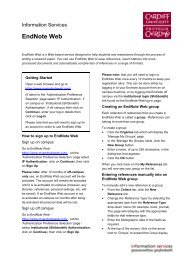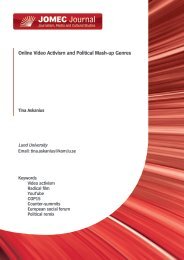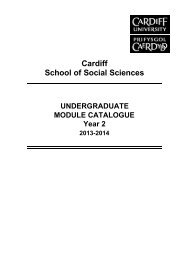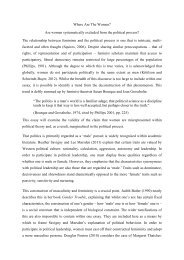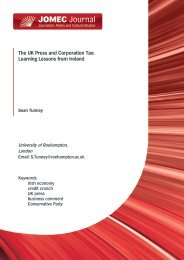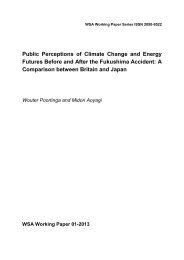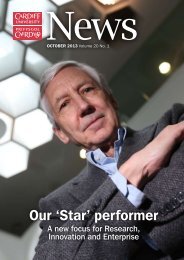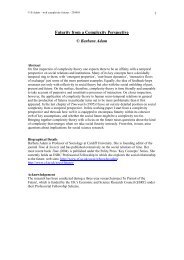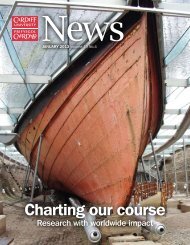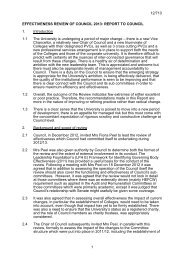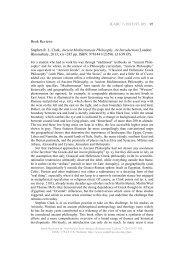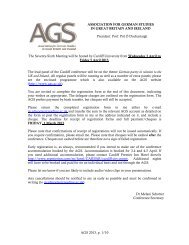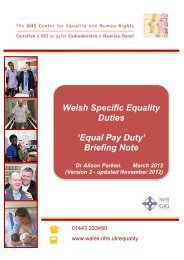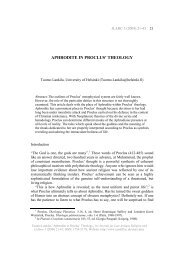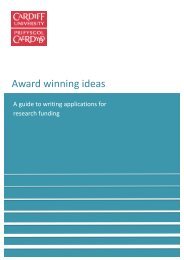Undergraduate Ancient History Degrees - Cardiff University
Undergraduate Ancient History Degrees - Cardiff University
Undergraduate Ancient History Degrees - Cardiff University
Create successful ePaper yourself
Turn your PDF publications into a flip-book with our unique Google optimized e-Paper software.
If you have any questions about<br />
studying <strong>Ancient</strong> <strong>History</strong> at <strong>Cardiff</strong>,<br />
our website provides information on<br />
a wide range of topics, and to<br />
supplement this we offer the views of<br />
current and past students by asking<br />
them to answer some of the most<br />
frequently asked questions.<br />
How big a change is<br />
university from school?<br />
Joanne from Cheltenham writes...<br />
“The change from School to Uni wasn’t as<br />
big or scary as I first imagined. In the first<br />
year your tutors try to make you feel<br />
welcome and are very friendly, and in the<br />
second year you feel very settled. Making<br />
friends is easy as you are all in the same<br />
boat. There’s a lot more freedom<br />
compared to school... There is plenty of<br />
work, but all tutors are happy to help in<br />
my experience.”<br />
Why should I study <strong>Ancient</strong><br />
<strong>History</strong> at <strong>Cardiff</strong>?<br />
Tom from Bridgend writes…<br />
“<strong>Ancient</strong> <strong>History</strong> at <strong>Cardiff</strong> is well taught<br />
by lecturers who know every inch of<br />
their subject and are excellent teachers.<br />
<strong>Cardiff</strong>’s superb three subject Year One<br />
allows you to get used to uni life and<br />
work schedule whilst allowing you to see<br />
if other subjects, say Spanish or<br />
Philosophy had actually been your true<br />
calling.”<br />
Tamara from Aylesbury writes…<br />
“The three subject Year One is great. It<br />
builds other skills and knowledge and<br />
allows you to meet more people too.”<br />
Frequently Asked Questions<br />
Views from current and past students<br />
Is there a wide choice of<br />
topics within ancient history?<br />
Tom from Bridgend writes…<br />
“The credit system and alternating subject<br />
years gives you access to a wide array of<br />
subject areas and periods or allows you to<br />
focus on one or two specific areas. I studied<br />
the Roman Republic, Post-Roman Celtic<br />
Britain, the Greek Army, Egypt, Carthage<br />
and the Anglo-Saxons but others have<br />
examined the Greek City States,<br />
Byzantium, Gender and Sexuality, Iron Age<br />
Britain and the Vikings. Some of these<br />
courses are Archaeology modules but the<br />
close links within the School allows<br />
students to take 20 credit modules from<br />
another subject area such as <strong>History</strong>,<br />
Conservation or Archaeology.”<br />
How easy is it to adjust as an<br />
overseas student?<br />
Yiota from Greece writes…<br />
“Life in <strong>Cardiff</strong> as an undergraduate at<br />
SHARE is particularly exciting. As a first<br />
year, I had the chance to meet many<br />
other students from Britain and all around<br />
the world. This was a fascinating experience<br />
and was a great opportunity to interact<br />
with people from different cultural<br />
backgrounds. There are various student<br />
societies to cover almost, if not all,<br />
personal and intellectual interests. These<br />
are lively hubs, which link people with<br />
shared interests together. Being the first<br />
time that I was living abroad, I had to<br />
adjust myself to a different approach to<br />
organisation and study. Especially at the<br />
beginning this can be difficult, however,<br />
the support that both <strong>Cardiff</strong> <strong>University</strong><br />
and the Students Union provide, proved<br />
invaluable, not just of social nature, but<br />
for other issues (from personal to<br />
administrative). A sudden shower of rain<br />
has always been a good ‘excuse’ to visit<br />
the National Museum, which is just<br />
around the corner!”<br />
Will it help me find a career?<br />
Tom Hay, (BA <strong>Ancient</strong> <strong>History</strong> & MA <strong>Ancient</strong><br />
<strong>History</strong> and Society). Current post: Student<br />
Recruitment and Events Manager...<br />
“My degree in <strong>Ancient</strong> <strong>History</strong> helped me<br />
develop and enhance a wide range of skills<br />
that I have been able to transfer and utilise<br />
in my professional life, particularly my<br />
writing, research and analytical skills. From<br />
the start of the degree we were encouraged<br />
to contribute our thoughts and engage with<br />
staff and other students, helping me to<br />
improve my public speaking and all round<br />
confidence.<br />
All of my roles to date have required a high<br />
level of communication and analytical skills.<br />
My first real experience of public speaking<br />
was in a seminar and I have carried this<br />
forward in to my career where I regularly<br />
deliver presentations. I frequently analyse a<br />
variety of complex data sets to help inform<br />
policy and strategy and without this skill I<br />
would not have been able to progress<br />
through my career as I have. When writing<br />
essays we learned the importance of<br />
evidencing our arguments and this<br />
approach has proved invaluable when<br />
presenting the results of my professional<br />
work. Knowing how to research this<br />
evidence has also been crucial.”<br />
David Marvelley. (BA <strong>Ancient</strong> <strong>History</strong> &<br />
Archaeology). Current post: Police Officer,<br />
South Wales Police.<br />
How has your subject at degree<br />
helped you in your career?<br />
“The greatest thing the degree taught me<br />
was patience. It takes three years to<br />
attain a degree in ancient history and it<br />
taught me that with patience I can attain<br />
the things I want by working hard and by<br />
being patient. I’d wanted to be a police<br />
officer since I was eleven years old, but<br />
had failed numerous times to pass the<br />
initial recruitment test. After my degree,<br />
it gave me the confidence to try again,<br />
and trust in my abilities. I knew I was<br />
never going to be very good in maths for<br />
example, but the degree demonstrated<br />
how I could develop other skills ... to<br />
counterbalance the not so good ones.”<br />
Brief career history since graduation:<br />
Graduation 2006. Straight into the<br />
position of a Police Community Support<br />
Officer in South Wales Police for four years.<br />
My position is now as a Police Officer.<br />
SCHOOL OF HISTORY, ARCHAEOLOGY AND RELIGION, ANCIENT HISTORY DEPARTMENT, CARDIFF UNIVERSITY • 5



